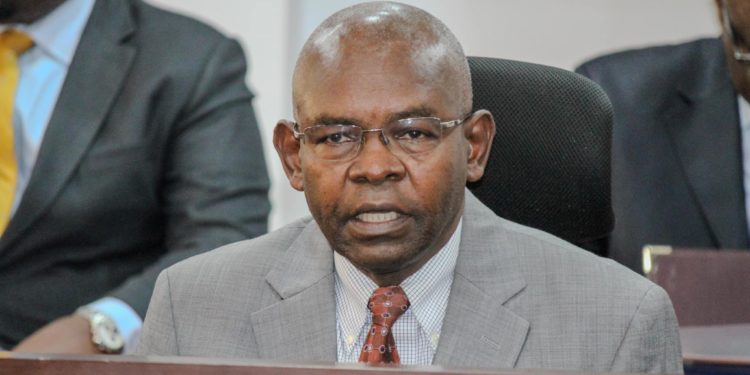The Central Bank of Kenya (CBK) has disclosed its decision to award a KES 14.8 billion (€103 million) contract to German firm Giesecke+Devrient Currency Technologies GmbH (G+D) for printing new banknotes, citing potential currency shortages and the need for enhanced security features.
This move has prompted parliamentary scrutiny and raised questions about Kenya’s currency management strategy.
Appearing before the National Assembly’s Finance and National Planning Committee, CBK Governor Dr. Kamau Thugge defended the procurement of new currency worth KES 689 billion. “The classified procurement was undertaken to avert a stock-out crisis,” Dr. Thugge explained. “The procurement process was conducted in accordance with the Public Procurement and Asset Disposal Act (PPADA), and with the approval of the National Security Council and the Cabinet.”
The contract marks a significant shift from Kenya’s previous arrangement with British firm De La Rue, which had been printing the country’s currency since establishing operations in Kenya in 1992. Dr. Thugge emphasized that the new contract is KES 532 million cheaper than the previous arrangement, presenting a cost saving for the country.
Under the new contract, G+D will print a total of 2.04 billion notes across various denominations: 460 million 50-shilling notes, 690 million 100-shilling notes, 260 million 200-shilling notes, 170 million 500-shilling notes, and 460 million 1,000-shilling notes.
The announcement has prompted lawmakers to demand a thorough examination of the procurement process. Committee Chairman Hon. Kuria Kimani called for the CBK to provide detailed documentation to confirm that due process was followed.
“This Committee is concerned that the firm which had very good and modern infrastructure has closed down and business has now gone to a firm operating outside the county, leaving in its trail job losses and loss of business from Kenya’s neighbours who were relying on the company to print their currency,” Hon. Kimani stated.
The closure of De La Rue’s Kenyan operations has raised concerns about job losses and the potential economic impact. Several committee members, including Hon. David Mboni of Kitui Rural and Hon. Joseph Munyoro of Kigumo, expressed worry over the liquidation of Kenya’s 40% stake in De La Rue’s local subsidiary and the resulting unemployment.
Dr. Thugge addressed these concerns, stating that De La Rue’s decision to exit the Kenyan market was made independently by the company. He added that there was little likelihood of G+D utilizing De La Rue’s existing infrastructure in Kenya.
The new currency, which is already in circulation in the 1,000-shilling denomination, features updated security measures. Paul Wanyagi, CBK’s Director of Currency Operations, explained, “The new notes bear the signature of the Governor of the Central Bank of Kenya, Dr. Kamau Thugge, that of the Principal Secretary, National Treasury, Dr. Chris Kiptoo, the year of print – 2024, and new security threads with colour changing effects that are specific to each denomination.”
Dr. Thugge assured the committee that the introduction of the new notes does not constitute a demonetization effort, and the existing currency will remain legal tender. This clarification comes in the wake of Kenya’s 2019 currency change, which saw the withdrawal of the old 1,000-shilling note to combat illicit financial flows and counterfeiting.
The committee also explored the possibility of introducing digital currency, given G+D’s capabilities in this area. However, Dr. Thugge indicated that such a move is not a priority for the CBK at present, citing Kenya’s advanced mobile money ecosystem and referencing Nigeria’s unsuccessful attempt to introduce e-currency.
As the new notes enter circulation, the CBK faces the challenge of educating the public on proper currency handling. Mr. Wanyagi highlighted the need for improved awareness, noting that rough handling of lower denomination notes has led to their frequent withdrawal from circulation.
The currency printing deal comes at a time when Kenya is grappling with economic challenges, including a depreciating shilling and high inflation rates. However, the committee acknowledged recent improvements in these areas, with Hon. Kimani commending Dr. Thugge and his team for “having contained inflation and the exchange rate against the dollar for several months consistently.”
The decision to award the contract to G+D has also sparked debate about the future of currency printing in Kenya. Some lawmakers suggested exploring the possibility of reviving local currency printing capabilities, while others questioned the long-term implications of relying on foreign firms for such a critical national function.
Dr. Thugge maintained that the decision was made in the best interest of Kenya’s economic stability and security. He emphasized that the new contract with G+D would ensure a steady supply of high-quality, secure banknotes to meet the country’s needs in the coming years.

















